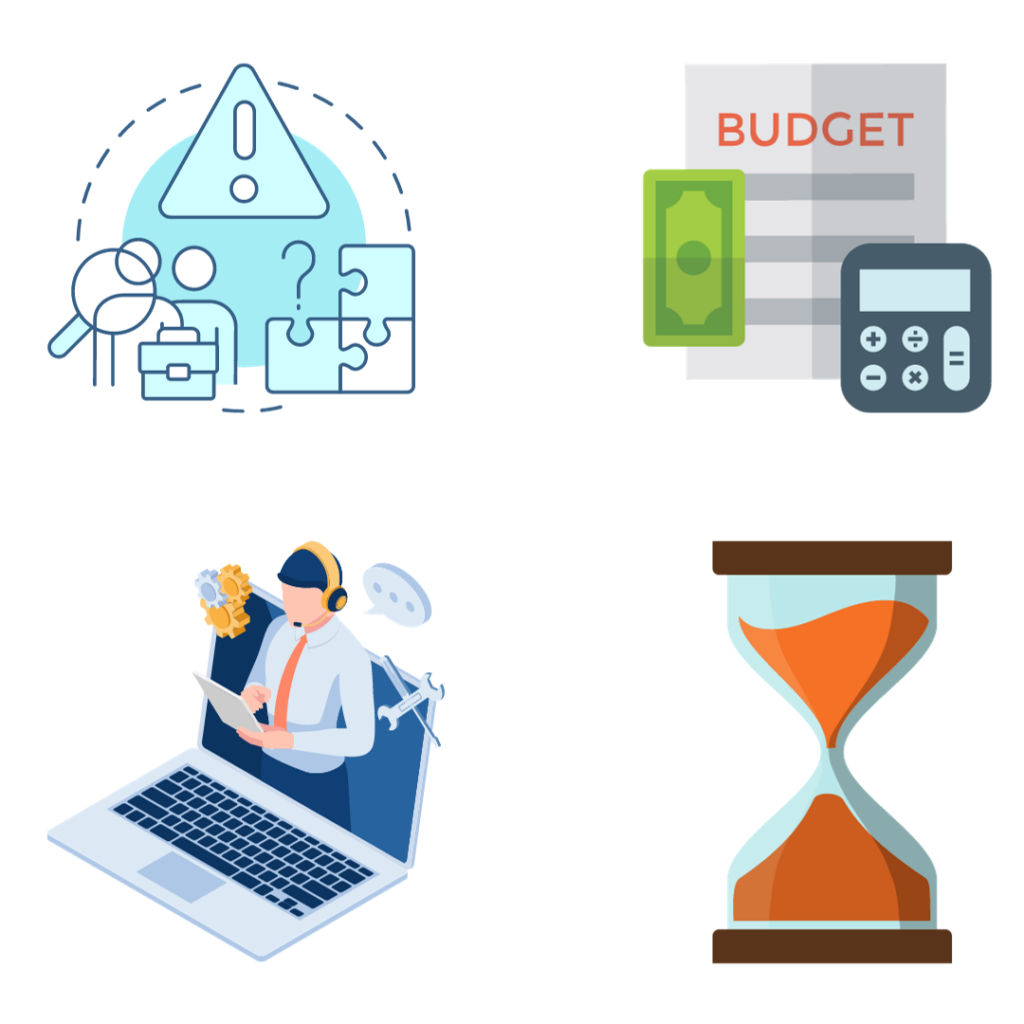Crypto Tax Software Vs CPA: What’s Right for You?
The decision between crypto tax software and a CPA depends on your specific situation. Consider your transaction complexity, budget, tech comfort, and time availability. Weigh the pros and cons, and remember, a hybrid approach is usually the best option. If you’re still not sure, consult with a CPA.
With increasing scrutiny by regulators and the mounting complexity of crypto tax regulations, the stakes are higher than ever. Even the smallest of mistakes can lead to audits or penalties. In times like these, ensuring the accuracy of your tax reporting is paramount.
In this blog post, we will lay down the factors one must consider when choosing between the two, the benefits and drawbacks, and a step-by-step guide on making a decision.
Deciding Factors When Choosing Between Crypto Tax Software and a CPA

Which is the better option between crypto tax software and a CPA? While there is no one-size-fits-all answer, understanding the factors at play can help you make a more informed decision.
Complexity of Crypto Transactions
While crypto tax software works well for straightforward transactions, a CPA’s expertise becomes invaluable when your crypto activities involve trading various cryptocurrencies in large volumes or engaging in decentralized protocols. They help decipher the intricacies of your crypto transactions and ensure accurate reporting.
Budget and Cost Considerations
Crypto tax software is often more budget-friendly upfront, with various pricing tiers to suit different needs. It’s a cost-effective choice for those with relatively straightforward tax obligations. On the other hand, hiring a CPA might involve higher fees, but it may save you money in the long run by optimizing your tax strategy, especially if you’re a high-net-worth individual.
Comfort with Technology
Crypto tax software relies on user input. So, it can be a suitable choice for you if you’re tech-savvy and feel confident in your ability to input your data accurately. However, if you’re less tech-oriented or simply prefer to leave the technical aspects to the experts, a CPA can provide peace of mind by handling the entire process for you.
Time Constraints
Crypto tax software is quite effective for busy professionals. It automates many aspects of tax preparation, allowing you to focus on your investments or work. Conversely, engaging a CPA might require more of your time for communication and gathering necessary documents but relieves the tax compliance burden, freeing you to concentrate on your investment strategies.
Ultimately, the choice between crypto tax software and a CPA should align with your unique tax situation. Factors may include the types of crypto assets you hold, your trading frequency, financial resources, and your comfort with technology.
With that out of the way, let’s look at both options, weigh their pros and cons, and figure out which solution works best for different types of individuals
Option 1: Crypto Tax Software

Crypto tax software works by connecting to your crypto exchange accounts and wallet addresses. It automatically imports your transaction data, including buys, sells, trades, and transfers. Then, it crunches the numbers, applies the relevant tax rules, and generates accurate tax reports.
Benefits of Using Crypto Tax Software
Automation and Convenience: Think of crypto tax software as your personal crypto accountant intern. It’s not perfect, but it automates the number-crunching, eliminating the need for manual calculations, helping you save time, and reducing the risk of errors.
Cost-Effectiveness: Most crypto tax software solutions offer a range of pricing options to suit different budgets. In comparison to hiring a CPA, they are often more cost-effective, especially for those with straightforward tax situations.
Accuracy and Record-Keeping: Most crypto tax software, like Bitcoin.Tax, are programmed to apply the latest tax laws and regulations. Additionally, it maintains a comprehensive record of your crypto transactions, which can be valuable for future reference or audits.
Drawbacks of Crypto Tax Software
Limitations in Handling Complex Tax Scenarios: While crypto tax software is excellent for straightforward transactions, it may struggle with intricate crypto activities like yield farming, staking, or participating in multiple ICOs. In such cases, a human CPA’s expertise is necessary.
For instance, if you’ve participated in DeFi liquidity pools with complex token swap rules and yield farming strategies, crypto tax software might fail to capture the tax implications accurately.
Dependence on User Input Accuracy: The precision of your tax reports depends on how precise the data you put in is. Mistakes or missing information can lead to wrong tax calculations, which might cause problems with tax authorities. One of the most common crypto tax tool problems is missing transactions, leading to inaccurate tax calculations and reports later on.
Who Benefits from Crypto Tax Software?
Crypto tax software is well-suited for investors and traders with relatively simple crypto portfolios and transactions, such as:
Hobbyist Investor: Individuals who invest in cryptocurrencies on an irregular basis and mainly hold their assets long-term can benefit from crypto tax software. These investors often have fewer transactions to report, making it easier to use automated software to calculate and report their gains and losses accurately.
Part-Time Crypto Trader: Those who engage in part-time or occasional crypto trading can find crypto tax software useful. It simplifies the tax reporting process without the need for extensive manual calculations for them.
Option 2: Hiring a CPA (Certified Public Accountant)

A Certified Public Accountant, or CPA for short, is a financial expert specializing in accounting, tax preparation, and financial planning. If you’re a crypto investor or trader, you would ideally look for CPAs with extensive knowledge, experience, and expertise in crypto taxation laws.
Benefits of Hiring a CPA
Expertise and Personalized Advice: A CPA’s expertise lies in their deep knowledge of tax regulations, ability to navigate complex crypto transactions, and capacity to optimize your tax strategy based on your unique situation while ensuring compliance with the law.
Handling Complex Tax Situations: If your crypto activities involve intricate strategies like yield farming, staking, or participating in initial coin offerings (ICOs), CPAs can unravel the complexities and calculate your taxes accurately.
Audit Support: In case you face a crypto tax audit, your CPA will be by your side, offering support and guidance. They can help you gather the necessary documents and represent you during the audit, ensuring you’re well-prepared.
Peace of Mind: Knowing that an expert is managing your crypto taxes can provide much-needed peace of mind so you can focus on your priorities.
Drawbacks of Hiring a CPA
Cost: Hiring a CPA can be more expensive compared to using crypto tax software. If you have a relatively simple tax situation, the cost of hiring a CPA may outweigh the benefits.
Dependency: When you hire a CPA, you rely on them to handle your tax affairs. This means you may need to communicate with them regularly, provide them with your financial documents, and be available for discussions. This dependency can be a drawback for people who prefer a more hands-off approach.
Time: Building on the last point, preparing taxes with a CPA can take time, as you’ll need to schedule meetings, exchange information, and wait for them to complete the work.
Risk of Human Error: While CPAs are skilled professionals, they are not immune to making mistakes. Errors in tax calculations or advice could potentially lead to issues with tax authorities.
However, you can avoid this by hiring a CPA with a good track record and positive client testimonials. Check out our guide on how to choose the best crypto CPA.
Who Might Benefit from Hiring a CPA?
Not everyone needs a CPA for their crypto taxes, but some situations where hiring one makes sense include:
Large Portfolios: You may benefit from hiring a CPA if your crypto portfolio is extensive or diversified across many assets.
Complex Transactions: A CPA’s expertise can help you navigate complex transactions or gray areas and ensure accurate reporting.
Businesses and High-Volume Traders: CPAs are essential for crypto-related businesses and high-volume traders, as they often deal with intricate tax challenges and reporting requirements.
Peace of Mind Seekers: Some individuals prefer the peace of mind that comes with professional assistance. If you’d rather let an expert handle your crypto taxes, go for a CPA.
Making the Decision: Choosing Between Crypto Tax Software and a CPA
Choosing between crypto tax software and a Certified Public Accountant (CPA) is a crucial decision, and as we explained before, it often boils down to your specific situation and preferences. Here is a step-by-step guide to help you make the decision:
1. Assess Your Crypto Tax Needs
The first step is to take a close look at your crypto tax situation. Consider the following questions:
- How complex are your crypto transactions? Do you engage in activities like yield farming, staking, or ICO participation?
- What is your budget for managing your crypto taxes? Are you looking for a cost-effective solution?
- Are you comfortable using technology to input your transaction data and generate tax reports?
- How much time can you dedicate to managing your crypto taxes?
2. Weigh the Pros and Cons
Next, weigh the advantages and disadvantages of both options:
Crypto Tax Software
| Pros: | Cons: |
| 1. Automation and convenience. 2. Cost-effectiveness for simpler tax situations. 3. Accuracy and record-keeping. | 1. Limitations with complex tax scenarios. 2. Reliance on user input accuracy. |
Hiring a CPA
| Pros: | Cons: |
| 1. Expertise and personalized advice. 2. Handling complex tax situations. 3. Audit support. | 1. Higher cost compared to software. 2. Requires active communication and document sharing. |
3. Consider a Hybrid Approach
Remember that your decision doesn’t have to be an either/or scenario. Even if you decide to hire a CPA, you might still need to use a crypto tax software to simplify the record-keeping and calculation process to save time.
Use Bitcoin.Tax for a free or an affordable membership based on your specific needs. If you’re unsure about which crypto tax software to choose, seek recommendations from our list of the best crypto tax software.
4. Consult with a CPA for Guidance
If you’re leaning toward hiring a CPA but aren’t sure where to start, check out this guide or consider consulting with a few CPAs to discuss your needs and obtain quotes. This initial consultation can help you gauge their expertise and determine if their services align with your needs.
Whether you choose crypto tax software, a CPA, or a combination of both, ensure that you’re comfortable with your choice and confident in your ability to meet your crypto tax obligations accurately and on time.
FAQ
How to calculate your crypto tax for free?
You can calculate your crypto tax for free using Bitcoin.Tax’s free membership, which allows you to input and calculate your crypto transactions without any cost.
What is the easiest way to calculate crypto taxes?
The easiest way to calculate crypto taxes is by using specialized crypto tax software. These user-friendly tools automate much of the process, simplifying calculations and generating accurate tax reports based on your transaction history.
Do you need an accountant for crypto?
Whether you need an accountant for crypto depends on the complexity of your crypto activities and your comfort level with tax regulations. For straightforward situations, crypto tax software may suffice. However, for complex transactions and a high level of expertise, a Certified Public Accountant (CPA) can provide valuable assistance in optimizing your tax-saving strategy and ensuring compliance. It’s a matter of individual circumstances.
What accountants specialize in crypto?
Accountants who specialize in crypto are typically Certified Public Accountants (CPAs) with expertise in crypto taxation. To find a crypto-savvy CPA, you can seek referrals from other crypto investors, use our online directory of top-notch crypto tax professionals, or check with professional organizations specializing in blockchain and cryptocurrency.